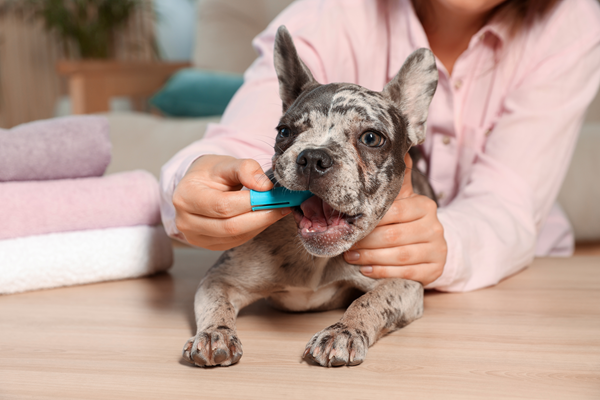
Welcome, pet lovers, to a discussion that’ll leave you grinning from ear to ear (or should we say tooth to tooth)! February is known as Pet Dental Health Month, but why confine the celebration to just one month when our furry friends’ dental health deserves attention year-round? Let’s sink our teeth into the reasons why every month should be Pet Dental Health Month.
- Fresh Breath, Happy Pet: We all love snuggling up to our pets, but it’s hard to enjoy cuddle time when they have stinky breath! Regular dental care helps keep your pet’s breath fresh and their kisses sweet, making every day a delight.
- Preventing Dental Woes: Just like humans, pets can suffer from dental problems like gum disease and tooth fractures. By prioritizing dental health all year, we can prevent painful dental issues that may require costly treatments down the road.
- Chew on This: Chewing isn’t just fun for pets, it’s also beneficial for their dental health! Providing dental chews and toys approved by the Veterinary Oral Health Council (VOHC) year-round helps keep their teeth cleaner, reducing plaque and tartar buildup.
- Aging Gracefully: As our pets age, they become more susceptible to dental issues. By incorporating regular dental care into their routine from a young age, we can help them maintain healthy teeth and gums well into their golden years.
- Overall Health Boost: Did you know that dental health is linked to overall health in pets? Poor oral hygiene may lead to systemic health problems, including heart disease and kidney issues. By promoting good dental habits all year, we’re supporting our pets’ overall well-being.
- Say Cheese: A healthy smile is a happy smile! By keeping our pets’ teeth clean and gums healthy, we’re not just ensuring their physical health; we’re also preserving their winning smiles for years to come. Plus, who can resist a pet with pearly whites?
Brush Those Gums!
Brushing your pet’s teeth can seem daunting, but with the right approach, it can become a manageable part of their routine. Once you have the OK from your veterinarian to brush your pet’s teeth, introduce your pet to the toothbrush and toothpaste gradually, using pet-specific products and positive reinforcement.
Aim to brush their teeth daily, focusing on the outer surfaces of the teeth with gentle circular motions around the gumline (where the gums meet the teeth). Lift their lips to reach the back teeth, which are prone to tartar buildup. Be patient and calm throughout the process, taking breaks if needed, and rewarding good behavior with treats or praise.
Monitor for signs of dental issues and plan for professional veterinary cleanings to supplement your at-home care. With consistency and patience, you can help maintain your pet’s dental health and keep their smile bright!
Pet Dental Health Month may officially be in February, but let’s make every month a celebration of our furry friends’ dental health. By prioritizing regular dental care, we’re not just keeping our pets’ smiles bright, we’re also giving them the gift of a happy, healthy life. So, grab that toothbrush (or should we say “toothbrush for pets”) and let’s keep those tails wagging and those whiskers smiling all year long!
